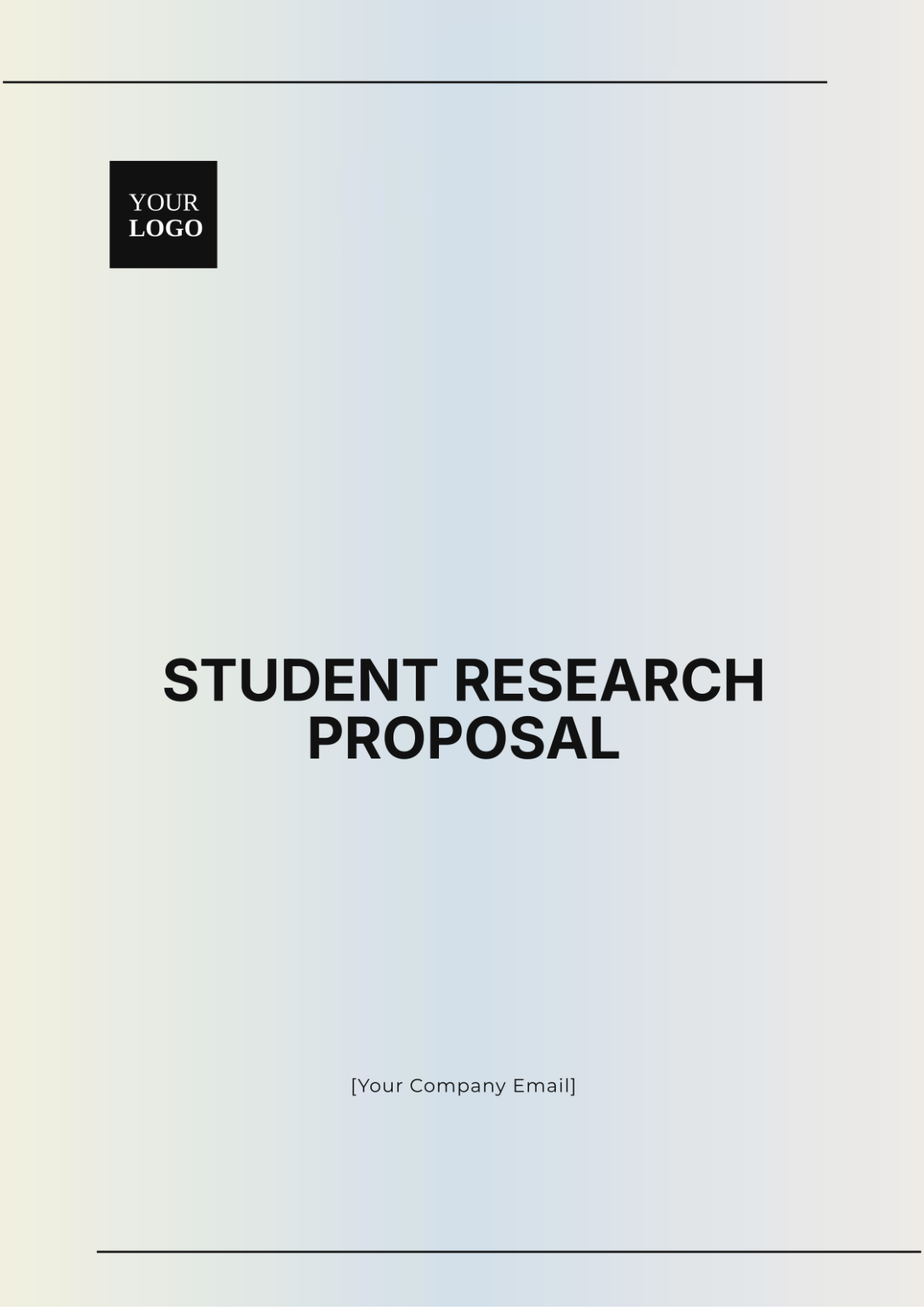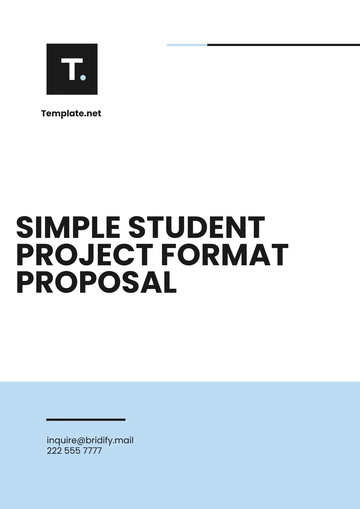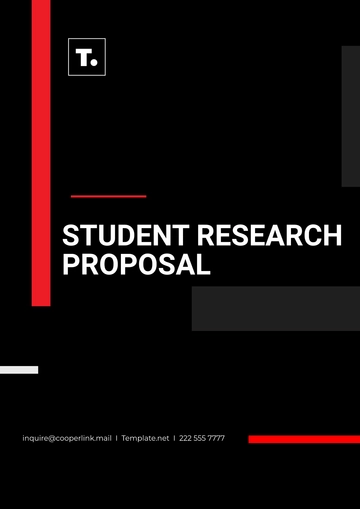Free Student Research Proposal

Prepared by: [Your Name]
I. Abstract
This research proposal aims to investigate the impact of social media on the academic performance of high school students. Given the increasing usage of social media platforms like Facebook, Instagram, Twitter, and TikTok among adolescents, it is crucial to understand how these activities may affect their educational outcomes. By employing a mixed-methods approach, this study will gather quantitative and qualitative data to provide a comprehensive understanding of the relationship between social media usage and students' academic achievement.
II. Introduction
The prevalence of social media has increased rapidly over the past decade, reshaping the way individuals interact and communicate. For high school students, social media has become an integral part of their daily lives. While these platforms offer various benefits, such as easier communication and entertainment, they also raise concerns regarding their potential impact on students’ academic performance.
III. Literature Review
A broad range of studies have been conducted to explore the relationship between social media usage and academic performance. Some studies have found a negative correlation, suggesting that excessive use of social media can distract students from their academic responsibilities. Other researchers argue that social media can also serve educational purposes, providing valuable resources and support for collaborative learning.
Smith, A., & Anderson, M. (2058). Social Media Use in 2058. Pew Research Center.
Junco, R. (2052). Too much face and not enough books: The relationship between multiple indices of Facebook use and academic performance. Computers in Human Behavior, 28(1), 187–198use.
IV. Research Questions
How does the frequency and intensity of social media usage affect the academic performance of high school students?
What are the perceptions of students, teachers, and parents regarding the impact of social media on academic achievement?
Can social media be used as an effective educational tool to improve student learning outcomes?
V. Methodology
This study will adopt a mixed-methods approach, combining both quantitative and qualitative research techniques.
A. Quantitative Method
A survey will be distributed to 300 high school students to collect data on their social media usage patterns and academic performance. The survey will include questions related to the time spent on social media, types of activities performed, and GPA scores. The data collected will be analyzed using descriptive statistics and regression analysis to determine correlations.
B. Qualitative Method
In-depth interviews will be conducted with 20 students, 5 teachers, and 5 parents to gather their perspectives on the impact of social media on academic performance. The interviews will be transcribed and analyzed using thematic analysis to identify common themes and insights.
VI. Expected Results
This research is expected to provide a nuanced understanding of how social media influences academic performance. It is hypothesized that excessive social media usage hurts students' GPAs, but strategic use of social media for educational purposes may yield positive outcomes.
VII. Discussion
The findings of this study will have significant implications for educators, policymakers, and parents. It will contribute to the ongoing debate about the role of social media in education and provide recommendations for balancing social media usage among high school students.
VIII. Conclusion
This research proposal outlines a comprehensive plan to investigate the impact of social media on high school student's academic performance through a mixed-methods approach. By exploring both quantitative and qualitative dimensions, the study aims to provide a holistic understanding of this complex relationship.
- 100% Customizable, free editor
- Access 1 Million+ Templates, photo’s & graphics
- Download or share as a template
- Click and replace photos, graphics, text, backgrounds
- Resize, crop, AI write & more
- Access advanced editor
The Student Research Proposal Template, offered by Template.net, is a highly customizable and user-friendly resource designed to help students create professional research proposals. Easily downloadable and printable, this template saves time while ensuring quality. Fully editable in our AI Editor Tool, it allows for personalized modifications to meet specific academic requirements. Get started with your research proposal today!
You may also like
- Business Proposal
- Research Proposal
- Proposal Request
- Project Proposal
- Grant Proposal
- Photography Proposal
- Job Proposal
- Budget Proposal
- Marketing Proposal
- Branding Proposal
- Advertising Proposal
- Sales Proposal
- Startup Proposal
- Event Proposal
- Creative Proposal
- Restaurant Proposal
- Blank Proposal
- One Page Proposal
- Proposal Report
- IT Proposal
- Non Profit Proposal
- Training Proposal
- Construction Proposal
- School Proposal
- Cleaning Proposal
- Contract Proposal
- HR Proposal
- Travel Agency Proposal
- Small Business Proposal
- Investment Proposal
- Bid Proposal
- Retail Business Proposal
- Sponsorship Proposal
- Academic Proposal
- Partnership Proposal
- Work Proposal
- Agency Proposal
- University Proposal
- Accounting Proposal
- Real Estate Proposal
- Hotel Proposal
- Product Proposal
- Advertising Agency Proposal
- Development Proposal
- Loan Proposal
- Website Proposal
- Nursing Home Proposal
- Financial Proposal
- Salon Proposal
- Freelancer Proposal
- Funding Proposal
- Work from Home Proposal
- Company Proposal
- Consulting Proposal
- Educational Proposal
- Construction Bid Proposal
- Interior Design Proposal
- New Product Proposal
- Sports Proposal
- Corporate Proposal
- Food Proposal
- Property Proposal
- Maintenance Proposal
- Purchase Proposal
- Rental Proposal
- Recruitment Proposal
- Social Media Proposal
- Travel Proposal
- Trip Proposal
- Software Proposal
- Conference Proposal
- Graphic Design Proposal
- Law Firm Proposal
- Medical Proposal
- Music Proposal
- Pricing Proposal
- SEO Proposal
- Strategy Proposal
- Technical Proposal
- Coaching Proposal
- Ecommerce Proposal
- Fundraising Proposal
- Landscaping Proposal
- Charity Proposal
- Contractor Proposal
- Exhibition Proposal
- Art Proposal
- Mobile Proposal
- Equipment Proposal
- Student Proposal
- Engineering Proposal
- Business Proposal

